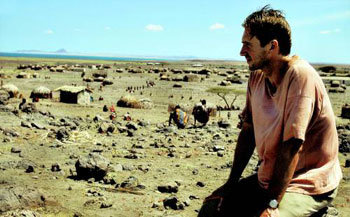Crash

Crash is a movie that addresses racial prejudice in American society through the lives of diverse couples who have nothing in common except that they all live in the same city, Los Angeles. The only places that theses dry and cold urbanites communicate passionately with each other are at car crash scenes.
All 15 different characters are of different races and ages, ranging from a white politician and a middle-class housewife to a white police officer to a black investigator to a female Hispanic investigator to an African-American adolescent to a white couple to an Iranian father and daughter. They all become entangled by chance through car accidents.
They all look normal on the outside, but inside they are not. The white cop looks after his sick father and is violent towards African-American suspects because he thinks that the social injustice his father, who was kind toward African-Americans, received is because they have taken away jobs.
The middle-aged Iranian man who cannot speak English is despised by people who are unable to distinguish Iraq from Iran and who associate his ethnicity with murder and terrorism. The uneducated and impoverished African-American adolescent thinks that black lives are miserable because of racism.
The white woman who is neglected by the politically ambitious husband endlessly suspects people, yells at them, and becomes hurt, but doesnt even know why she is doing this or what she is. Everybody is angry. Those who have are anxious, and those that do not have are discontent. This is due to loneliness that arises from alienation, prejudice, obsession, fear, anxiety, and misunderstanding. The monologue of the African-American investigator at the beginning of the movie sends this message cleanly and clearly.
It`s the sense of touch. In any real city, you walk, you know? You brush past people, people bump into you. In L.A., nobody touches you. We`re always behind this metal and glass. I think we miss that touch so much, that we crash into each other, just so we can feel something.
It is touching as it shows people at accidents sites before death, in extreme pain that they cannot stand and at the bottom of their sorrow so they can become closer, communicate, understand, and accept each other. It will open on April 6 in Korea rated PG 15.
Islam Culture Seen through Immigrant Workers
Syriana
George Clooney is a veteran CIA agent who focuses mainly on political conspiracy regarding Americas need for oil. Matt Damon is an energy analyst and, with a corporation lawyer and four Pakistani workers, portrays Islam as a subject of understanding rather than enmity to the American society.
The Americans in the movie become involved with Islam when one is assigned the mission to kill the heir to the throne in order to gain the rights to a gas field, one becomes the economic advisor to the royal successor who happens to be reform-minded, and one works a lawyer that deals with M&A. They all work for their country, but their country betrays them. The mind of Pakistani worker Wasim who voluntarily participates in a terrorist bomb attack is also portrayed objectively.
The movie connects the destiny of Islam culture, Americans, and Muslims, whether they agree or not, with oil, and shows the attempts to understand Islam, which has been embedded into American society after the 9.11 attacks. It is currently running and is rated PG 15.
Accusing Western Civilization and Africas Sacrifice
Constant Gardener
The plot revolves around the life and love of a widower who followed the footsteps of his human rights activist wife and finds conspiracy and injustice of a gigantic pharmaceutical company, with the movies background set in Kenya.
Although the movie title seems to have no connection with the plot initially, it implies the hobby of Justin, the main character and played by Ralph Fiennes. Justin falls in love with passionate human rights activist Tessa, played by Rachel Weisz, marries her, is assigned to the British Embassy in Kenya, and waits for his child to be born.
However, his happiness is shattered when his pregnant wife is murdered in the middle of the desert, and his fate heads toward tragedy. Tessa was uncovering the illegal drug testing conducted by a giant American pharmaceutical company on the impoverished Kenyan people. It is refreshing that Africa is not portrayed as underdeveloped country that needs development as the developed world sees it, but it is seen through the eyes of Africans. The screen showing the Kenyan slums full of color and the endless wilderness of reflects the directors affection toward Africa. This is summarized by Tessas cousin attending Justins funeral at the end of the movie:
There is no murder in Africa. Only painful death. We enjoy the benefits of civilization on top of such death. What we get easily comes from their lives being sold cheaply. Open in Korea on April 20, rated PG 15.
Mun-Myung Huh angelhuh@donga.com







